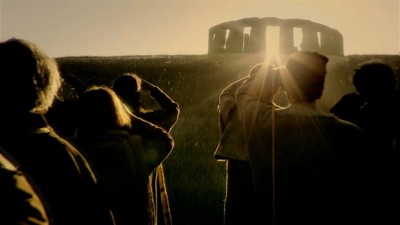| Reviews & Columns |
|
Reviews DVD TV on DVD Blu-ray 4K UHD International DVDs In Theaters Reviews by Studio Video Games Features Collector Series DVDs Easter Egg Database Interviews DVD Talk Radio Feature Articles Columns Anime Talk DVD Savant Horror DVDs The M.O.D. Squad Art House HD Talk Silent DVD
|
DVD Talk Forum |
|
|
| Resources |
|
DVD Price Search Customer Service #'s RCE Info Links |
|
Columns
|
|
|
Big History
A&E Video // Unrated // March 11, 2014
List Price: $39.99 [Buy now and save at Amazon]
The Series:
Big History is a way of looking at the past with a broader perspective than historians have traditionally used (or so the adherents claim). Instead of looking a linear progression of events, the field tries to embrace the whole of history and science in order to discover previously unknown links between seemingly disparate events. At least that's the theory. My only exposure to the discipline has been through Big History, a 17-episode documentary series that aired on The History Channel, and while the program is chocked full of interesting ideas and worthwhile information, it really didn't sell me on idea that the concept is radically different from other fields of study. That could have been because the fast-paced nature of the show and the short time allotted to each episode (30-minutes including commercials) meant that most of the points were glossed over.


Narrated by Brian Cranston, Big History is concerned with encompassing the whole of creation to explain just how humanity and the world came to look and behave the way it does now. Why is it that, all around the world, people wear pants? Why has gold been a valuable metal throughout history? Could salt be responsible for the placement of roads? These, and many other interesting questions, are examined in each episode and the results can be surprising. Instead of limiting their scope to traditional history, and by jumping forward and backwards through time, the show is able to explain some seemingly unusual behavior.
Take the link between roads and salt for example. When roads were first built in the US, they followed trails people used, which in turn came about because people followed worn animal trails. The animal trails usually went to salt licks, which were created when ancient seas evaporated. Therefore roads were created because of salt... or at least that's the argument that the program makes. It's a very interesting idea and one that may very well be true, but the show doesn't do a very good job of selling that position. They pretty much state their case state a series of facts, claim that they're all linked, and then move on to the next interesting thing about (in this case) salt.
And that's one of my main complaints with the show: it glosses over just about every point that it's trying to make. Why is gold valuable? Because it glitters. Without presenting any evidence, it is claimed that early humans on the plains of Africa searched for light glittering off of water in streams and lakes, which of course was vital for survival. They list other valuable things that glitter (chrome on cars and jewels), and then boldly state that human beings are "hard-wired" to value things that glitter and therefore gold is valuable. For a discipline that wants to embrace more than just history, I was hoping that they'd bring in some neurologists that could corroborate the theory, or at least explain away counter examples of valuable items that don't glitter. (Why don't we paint houses in bright, shiny colors?) But they don't. They just assume that stating that a series of facts are linked will be sufficient. They also need to check thier scripts more carefully. When the discuss why gold glitters, they get the science wrong. (They state that when light hits the outer shell of electrons in a gold atom, it causes them to form a cloud. They even have some animation to show the electrons changing from nice neat orbits, like planets, only to become a chaotic cloud when photons hit them. That's not how it works.)


Part of the reason that everything is discussed superficially is because of the style of the show. It's put together like a music video with fast cuts, exciting audio effects, and great pans across the CGI sections (which are repeated over and over). It's as if the writers were told that they target audience were people who couldn't hold their attention on any one thing for more than 60 seconds. (Which begs the question: do people with very short attention spans watch documentaries?) It's unfortunate that the show was created in such a hyper-kinetic fashion, because they really do bring up some very intriguing ideas. One of my favorites was that the size of ancient empires was limited to the speed of communication: if a message sent from the outer most regions to the capital took more than a week to be delivered, the empire couldn't grow much further. I was disappointed that they didn't explore that concept, or any others, in more detail.
The Blu-ray:
All 17 episodes, including the two-hour final installment, arrive on three Blu-ray discs housed in a single-width case.
Video:
The show is presented with a 1.78:1 aspect ratio and nice 1080p AVC encoded image. Overall the show looks nice with a good amount of detail and solid colors. The CGI scenes (which are endlessly repeated in each episode) come across as being soft and not as well defined, but they pan and zoom across these computer images so quickly that it's not really noticeable unless you're really looking for it. The archival footage appears to by upscale and consequently lacks some of the punch that the newly-filmed sections have.
Audio:
The audio on documentaries are usually pretty boring. Not so with this show. The creators mated a dynamic and hectic audio track to their hyper-kinetic visuals. There are lots to pans and sounds thrown to the rear speakers, and even the subwoofer gets a pretty good workout in each episode. The mix was nice, it never overpowered the narration and while they did go overboard in my opinion, it was refreshing to hear a documentary that did more than throw a standard stereo mix onto the images.
Extras:
The extras are limited to half an hour of deleted scenes that are all thrown on the final disc. These weren't too Earth-shattering, but if you really enjoyed the show you'll like watching these ten short clips.
Final Thoughts:
This is a show that has a lot of potential, but unfortunately it never quite lives up to it. There are a lot of interesting and intriguing concepts that are put forth, but none of them are looked at in any detail. The fast and hectic pace of the show gets annoying after a while too. It would make a good rental.
|
| Popular Reviews |
| Sponsored Links |
|
|
| Sponsored Links |
|
|
| Release List | Reviews | Shop | Newsletter | Forum | DVD Giveaways | Blu-Ray | Advertise |
|
Copyright 2024 DVDTalk.com All Rights Reserved. Legal Info, Privacy Policy, Terms of Use,
Manage Preferences,
Your Privacy Choices | |||||||














